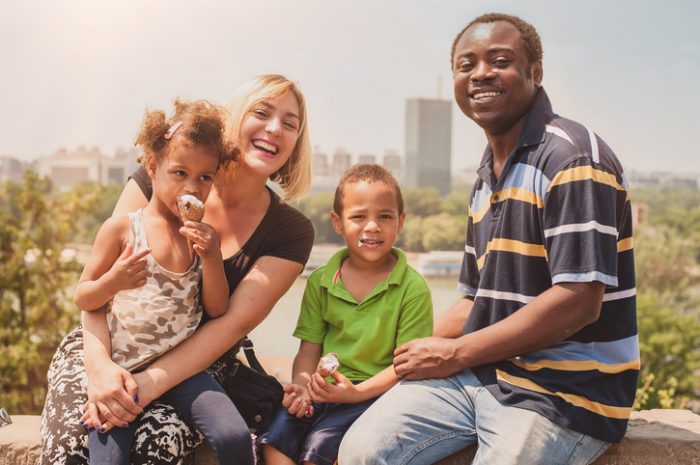Being an expat child or the child of an international marriage can be fun and exciting, as children move between different cultures and languages. But it’s not all sunshine and roses all the time. Kate Mayberry on BBC Capital looks at the bright side and also the more difficult side of being a « third culture kid ».

With mounting globalisation, and workers jumping from one country to the next, where do expat kids call home?
When children come to the end of their time at Garden International School in Kuala Lumpur, they receive a leaving kit. Inside: a sour sweet, a length of ribbon, a paper clip, a sponge and a rubber band.
The items were chosen to prompt discussion about what leaving means — bittersweet emotions, tying up loose ends, and making memories. Every departing child is also recognised during school assembly.
“We want to help them understand how important it is to say goodbye,” says Mariella Vittetoe, head of counselling at the school, which teaches a British curriculum. “If we have closure in this place, we will be able to have a smoother transition.”
About 65% of the Garden School’s 2,000 children come from countries outside Malaysia. For many, it’s not their first experience living overseas.
“We are constantly in transition,” adds Vittetoe, who is from Honduras. “Kids are coming and going all the time.”
These are Third Culture Kids (or TCKs), a term coined by US sociologist Ruth Hill Useem in the 1950s, for children who spend their formative years in places that are not their parents’ homeland. Globalisation has made TCKs more common.
Mostly, they are children of expatriate workers, but they can come from transnational marriages, or — as is increasingly common in Asia — attend an international school in their home country. TCKs often develop an identity that’s rooted in people rather than places.
Keeping an open mind
Philippa Matthew spent 14 years travelling. Her children, now young adults, grew up in a series of postings that took the family from Britain to the US, Indonesia and Norway. Matthew says her son and daughter enjoyed a privileged upbringing, but one that also gave them a better understanding of the world.
“It does end up marking them as different when they return, but they have to live with that,” she explains over coffee in Kuala Lumpur, where she and her husband moved last year. “[Their upbringing] sets them up to be more flexible and better able to cope with change.”
A 2011 online survey by Denizen, a publication targeting TCKs, found most of the 200 participants made their first move before the age of nine and had lived in an average of four countries. Most had degrees — 30% had a postgraduate qualification — and 85% spoke two or more languages. Those attributes help make TCKs attractive to employers.
Notable TCKs include former US President Barack Obama, who was born to a Kenyan father and American mother, and moved to Jakarta after his mother married an Indonesian. British actor Colin Firth lived in Nigeria, where his father worked in education, as well as in the US.
American sociologists David Pollock and Ruth Van Reken published Third Culture Kids: Growing Up Among Worlds, in 1999. Although Pollock died in 2004, Van Reken continues to research and lecture. She says TCKs are more likely to speak more than one language, have a broader world view and be more culturally aware. But she warns life as a TCK can create a sense of rootlessness and restlessness, where home is “everywhere and nowhere.”
When it gets hard
The repeated losses caused by regular moves can trigger anxiety and stress among TCKs, according to Lois Bushong, a family therapist based in Indiana in the US. She specialises in working with TCKs and wrote Belonging Everywhere and Nowhere; Insights into Counseling the Globally Mobile.
Many expatriates are on finite contracts as short as two years, forcing children to leave close friends and make new ones on a regular basis. The upheaval can also take its toll on those left behind.
Matthew recalls the biggest jolt for her children came when they returned to Britain as teenagers. Their new schools didn’t have the transition support programmes found in international schools, and her children couldn’t talk about their experiences without their new classmates perceiving them to be showing off.
“It’s definitely a lot easier [moving to] an international school because everyone’s in the same boat,” her son Chris recalls of that time. “Making friends when I moved back to Aberdeen at 16 was the hardest because everyone else there had been at school together since primary.”
It was a similar experience for Gillian Tapp, now 18 and a student at Northeastern University, when she returned home to the US after three years in Amsterdam. She was 14.
“I switched from a school with a super welcoming new student program to a school where I was the first new kid in years,” she says. “Everyone knew everyone and no one knew me. [They were] in a bubble and being friends with the new girl from Amsterdam who didn’t necessarily understand American fashion, and allegedly had an accent, was not one of their priorities.”
Coping with transition
Parents often try to minimise disruption by scheduling moves around school terms, key exams and major transitions (junior to senior, for example).
Counsellors note that problems are more likely to emerge around the ages of nine or 10, when friendships become more central to a child’s identity, and especially during teenage years. Kids can become withdrawn, isolating themselves from their classmates, or become angry, lashing out at those around them.
Bushong grew up as a missionary child in Latin America, and remembers repeated farewells: “I felt as if a small part of my own heart was torn out each time I had to tell close friends goodbye, knowing that I would probably never see them again.”
She encourages discussion within families to understand how everyone’s coping with the move. “Observe your children and if you see them acting abnormal(ly) or withdrawing, talk to them about what is going on,” Bushong says in an email. “Listen and validate the feelings of grief. This will help them move forward.”
That may be more difficult in some situations. Children brought up in difficult environments, perhaps where there are incidences of violent crime, kidnapping or political unrest, may be at risk of Post Traumatic Stress Disorder (PTSD). Ignoring potential problems can also store up trouble for later, when the TCK becomes an adult.
“If an individual has had a difficult experience in childhood and hasn’t been able to make sense of that, that can be carried into adult life,” cautions Kate Berger, a New Yorker who moved to The Netherlands to study and now runs the Expat Kids Club, working with schools and families handling international transitions. Still, she’s keen to emphasise that most TCKs benefit enormously from their childhood experiences.
Growing support
Luckily for 21st century TCKs there is more support than ever before. Over the past two decades, schools have beefed up counselling services and increasingly provide assistance to children from the time they arrive to the time they leave.
Jack Rice, 13, started at the Garden School two months ago after his parents joined the teaching staff. Born in the UAE, Jack’s lived in Saudi Arabia, Thailand and Qatar, but has joint British-Canadian citizenship and sees himself as Canadian. He admits it took a while to settle in, even with a helping hand, but a school camp to a jungle location outside Kuala Lumpur finally helped him bond with his classmates.
“Most of them have gone through the same things as me,” he says with a hint of a North American accent. “They’ve had to move again and again.”
Source: we’ve found this article by Kate Mayberry on BBC Capital.
